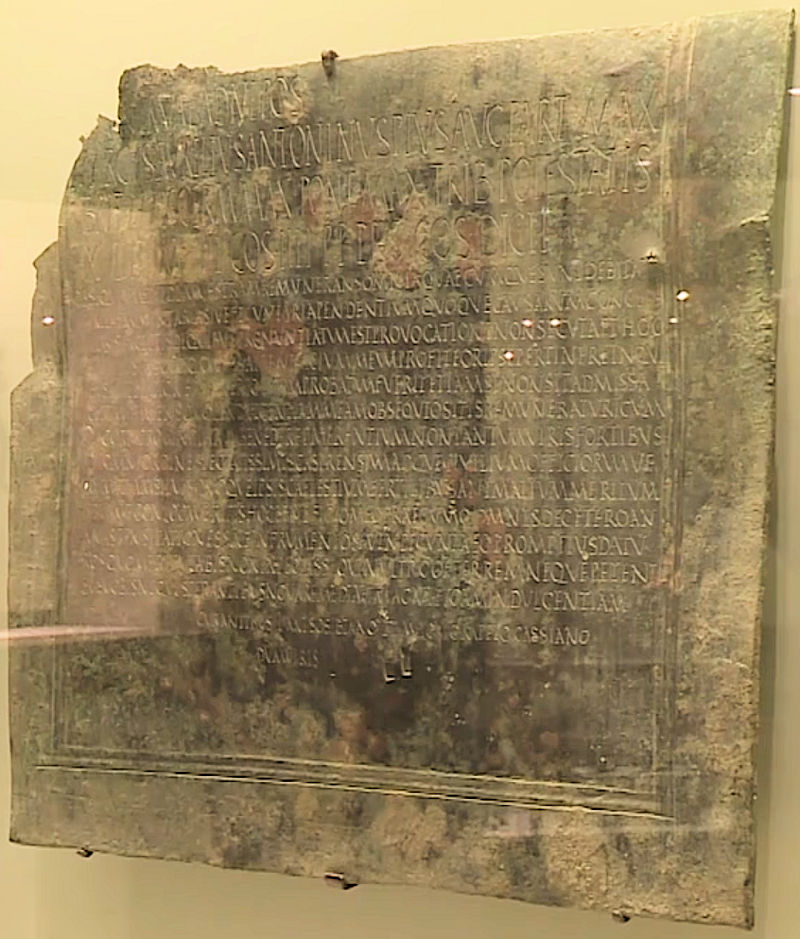In Mauretania Tingitana, in Volubilis (Moulay Idriss, near Meknès) an arch was erected in honour of Caracalla and his mother Julia Domna. It was damaged in the 18th century, probably by the Lisbon-earthquake of 1755, and restored in 1931. It was decorated with reliefs of weapons and Victories. In each long side are two large niches, above which are tondos with busts of the Four Seasons.
Volubilis, arch, east side.
Photo: Wikimedia, Ahmed.magdy.
Volubilis, arch, west side.
Photo: Wikimedia, Prioryman.On the two long sides of the arch were identical dedicatory inscriptions, dated to the period 10 December 216 - 8 April 217 AD. One is now on the east facade.
IMP(eratori) CAES(ari) M(arco) AVRELLIO ANTONINO PIO FELICI AVG(usto) PARTH(ico) MAX(imo) BRITT(anico) MAX(imo) GERM(anico) MAX(imo)
PONTIFICI MAX(imo) TRIB(unicia) POT(estate) XX IMP(eratori) IIII CO(n)S(uli) IIII P(atri) P(atriae) PROCO(n)S(uli) ET IVLIAE AVG(ustae) PIAE FELICI MATRI
AVG(usti) ET CASTRORVM ET SENATVS ET PATRIAE RES P(ublica) VOLVBILITANORVM OB SINGVLAREM EIVS
ERGA UNIVERSOS ET NOVAM SVPRA OMNES RETRO PRINCIPES INDVLGENTIAM ARCVM
CVM SEIVGIBVS ET ORNAMENTIS OMNIBVS INCOHANTE ET DEDICANTE M(arco) AURELLIO
SEBASTENO PROC(uratore) AVG(usti) DEVOTISSIMO NVMINI EIVS A SOLO FACIENDVM CVRAVITTo Emperor Caesar Marcus Aurellius Antoninus, pious, happy, Augustus, very great conqueror of the Parthians, Britons and Germans,
supreme pontiff, 20 times with tribunician power, 4 times imperator, 4 times consul, father of the fatherland, proconsul, and to Julia Augusta, pious, happy, mother
of Augustus and of the camps and of the senate and of the fatherland, the city of the Volubilitans, because of his remarkable
and new indulgence towards all, above all rulers in past times, raised an arch from the foundations,
with a six-horse chariot and all its ornaments, while it was started and dedicated by Marcus Aurellius
Sebastenus, procurator of the Emperor, very devoted to his divine majesty.The reconstructed inscriptions of the east and west facade.
EDCS-59100083.
Volubilis, arch, inscription on the east facade.
Photo: Wikimedia, Aatalbi.
Volubilis, plan.
Image: Wikimedia, Prioryman.
Sometime before 1946 a bronze inscription was found in the Colonia Iulia Valentia Banasa (Sidi Ali bou Djenoun), documenting favours bestowed by Caracalla on the city and perhaps on the entire province of Mauretania Tingitana. The text is from late 215 or 216 AD.

(titulature) MARCVS AVRELIVS ANTONINVS DICIT
OBSEQVIVM ET FIDEM VESTRAM REMVNERANS OMNIA QVAECVMQVE SVNT DEBITA FIS
CALIA FRVMENTARIA SIVE PECVNIARIA PENDENTIVM QVOQVE CAVSARVM CONCEDO
VOBIS EXCEPTIS DE QVIBVS PRONVNTIATVM EST PROVOCATIONE NON SECVTA ET HOC
AMPLIVS EAS QVOQ(ue) CAVSAS AT BENEFICIVM MEVM PROFITEOR IPSE PERTINERE IN QVI
BVS APPELLATIONEM INTERPOSITAM PROBATVM FVERIT ETIAM SI NON SIT ADMISSA
CERTVM HABENS QVOD INDVLGENTIAM MEAM OBSEQVIO SITIS REMVNERATVRI CVM
VICOR(um) ET PROVINCIARVM BENE DE RE P(ublica) MERENTIVM NON TANTVM VIRIS FORTIBVS
IN OMNI ORDINE SPECTATISSIMIS CASTRENSIVM ADQVE CIVILIVM OFFICIORVM VE
RVM ETIAM SILVIS QVOQVE IPSIS CAELESTIVM FERTILIBVS ANIMALIVM MERITVM
APVT ME CONLOCAVERITIS HOC BENEFICIO MEO PRAESVMO OMNES DE CETERO AN
NVAS PENSITATIONES SIVE IN FRVMENTO SEV IN PECVNIA EO PROMPTIVS DATV
ROS QVO ME REPVTABITIS NON EXPECTASSE QVIN VLTRO OFFERREM NEQVE PETENTI
BVS VOBIS NEQVE SPERANTIBVS NOVA REMEDIA ET MAGNIFICAM INDVLGENTIAM
CVRANTIBVS L(ucio) ANT(onio) SOSIBIANO ET AVLO POMPEIO CASSIANO
DV(u)MVIRIS(titulature) Marcus Aurelius Antoninus proclaims:
In rewarding your zeal and loyalty I remit whatever debts you owe
the fisc in grain or money, also the claims in pending suits
except those where judgment has been given and no appeal has been made.
More than this, I proclaim that my grace is extended also to those suits in which
proof can be furnished that an appeal has been entered, even if it has not yet been granted,
since I am confident that you will reward my indulgence with zeal,
not only by the service of brave men of villages and of provinces which deserve well of the State,
men who are most highly regarded in every rank of civil and of military posts,
but also by contributing from your forests which abound in celestial beasts,
when you have acquired credit with me for this favour. As for the future; I expect that
your annual taxes in grain or in money will be paid more promptly on this account,
when you recall that you never expected that I should offer voluntarily, without your asking
or even expecting it, unprecedented relief measures and generous indulgence.
Under the direction of Lucius Antonius Sosibianus and Aulus Pompeius Cassianus,
duumvirs.The bronze inscription from Banasa.
Rabat, Musée Archéologique. EDCS-08800084.
Image: Medi1TV. Translation: Ancient Roman Statutes, New Jersey 2003.There has been a lively debate about the celestial animals living in the forests near Banasa. Some have opted for elephants, recalling depictions of Emperors in quadrigae of elephants, and Cassius Dio (77,7,4), who says that Caracalla "took about with him numerous elephants". Others, hesitating, think of lions, suggesting that their skins would be used by Caracalla's bodyguard, which he called "lions" (Cassius Dio 78,6).